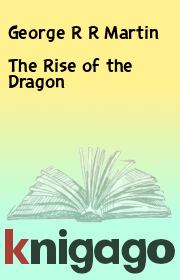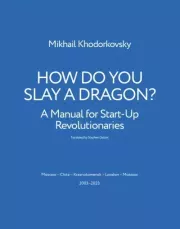Mikhail Khodorkovsky - How Do You Slay A Dragon
Название: | How Do You Slay A Dragon | |
Автор: | Mikhail Khodorkovsky | |
Жанр: | Старинная литература | |
Изадано в серии: | неизвестно | |
Издательство: | неизвестно | |
Год издания: | 2022 | |
ISBN: | неизвестно | |
Отзывы: | Комментировать | |
Рейтинг: | ||
Поделись книгой с друзьями! Помощь сайту: донат на оплату сервера | ||
Краткое содержание книги "How Do You Slay A Dragon"
Right at the start of this book, I had a great surprise. I know Mikhail Khodorkovsky’s story well. I reported for the BBC on his rise to prominence in the YUKOS oil company, his disputes with the newly-elected Russian President, Vladimir Putin, in the first years of the twenty-first century, and his arrest on trumped-up charges in October 2003 and subsequent imprisonment. Four days after his arrest I was due to have a meeting with him in Moscow. Instead, a meeting was arranged with a representative of the Russian Prosecutor’s Office to explain the arrest. The trial hadn’t yet begun. But the outcome was already evident.
К этой книге применимы такие ключевые слова (теги) как: Политика и события
Читаем онлайн "How Do You Slay A Dragon". [Страница - 7]
There are two reasons why no progress can be made on the path to democratic reform unless this totally parasitic property is wiped out. Firstly, if this property remains in the hands of the collective beneficiaries of the Putin regime it will be used to block any constructive activity attempted by the temporary government. And secondly, unless this property is confiscated it will be impossible to earn society’s trust; society won’t support any government that leaves this money in the hands of these people.
Therefore, the second essential social measure of the temporary government must be the expropriation of this parasitic capital from the Putin clan. The assets that are seized from them must be passed to public investment funds under the control of parliament. The income from the activity of these funds should be directed towards additional funding for social projects. First and foremost this should be for education and health care. This can be placed in individual savings accounts that will be opened for every citizen. This could be considered as a compensatory measure, as it would go some way to righting the wrongs that were committed by the state under its privatisation programme. So it would be a step towards re-establishing socio-economic justice.
In effect, Russia today lives under a state of emergency. There exists a regime of political terror. Any practical resistance to the authorities is paralysed. However, experience shows that this cannot continue forever. Any closed system ultimately contains within itself the reason for its collapse. Putin’s regime will be no exception. And even if right now it’s difficult to influence the longevity of this regime, it’s entirely possible to affect the pace of the post-regime recovery. This will largely depend upon the speed of reaction by the elites as to what is happening; on how much preparation is done to rethink Russian history; on there being a clear and achievable goal from those seeking change; and, even more importantly, on there being a detailed road-map for change.
The normalisation process after the fall of the regime will be made much simpler and swifter if a provisional consensus can be reached by society on all these points. The lack of such a consensus and especially the lack of an actual plan around which consensus can be reached will have a seriously adverse effect on society’s chances of repairing itself. Indeed, it may even make this impossible. Circumstances may well dictate that for a period of time – and this could be long drawn-out – spiritual and intellectual opposition may prove to be virtually the only form of resistance possible for the majority of those citizens who are opposed to the regime. But “otherworldliness” and the fact that this appears to be something abstract doesn’t lessen its historic significance. On the contrary, this is exactly where the frontline of the battle for the future of Russia lies today. Every action begins with a word; and it’s vital that this word is the right one and that it hits the target.
In today’s Russia there’s no place for politics and no motives for engaging in politics. But there will be in the future Russia. And it’s the thought of a Russia that confines Putinism to the past that inspires me to take up political activity. That future looks complicated. Putin will leave Russia with a difficult legacy that will mean future progress will not be easy. The path will be sown with the kind of historical traps that Russia has already fallen into on a number of occasions, and it’s ended up being stuck in them for decades.
I am convinced that the re-formation of Russia into a parliamentary and genuinely federal republic with strong local self-rule is the fulcrum that can provide the starting point from where we can cast off the curse of autocracy forever. At the same time I’m aware that reaching this starting point can be done in Russia only if we take the “left route”. My political goal today is to create a wide consensus in society both for the goal itself and for the methods by which it will be reached.
PART I. HOW DO YOU GET RID OF THE OLD DRAGON?
The vast majority of people live comfortably alongside the dragon until their final day; that being the day when they or their loved ones are killed, arrested or kicked out onto the street from their cosy little comfort zone. Love for the dragon is the natural state of affairs for the man on the street, which immediately becomes the main problem in any transitional period from dictatorship to democracy. It’s easier to get rid of the dragon than it is to defeat the ordinary person’s devotion to it. For this reason, getting rid of the dragon is not simply a lovely, one-act revolutionary show that ends with happy and joyous fireworks. It’s a drama that takes place over many acts, and has a complicated and sometimes tragic theme. And in each act of this drama, its actors must overcome difficult dilemmas, many of which don’t have straightforward solutions.
Chapter 1. The Strategy for Victory:
Peaceful Protest, or Peaceful Uprising?
What should be the strategy for victory in the battle against despotism? People who lived in the 18th, 19th, or especially the 20th Centuries would find it easy to answer this question. The strategy for victory is revolution.
But what sort of revolution? A violent one, of course. Marx wrote that revolution is the midwife of history. And one of the founding fathers of the USA, Abraham Lincoln, expressed it thus: “Whenever they shall grow weary of the existing government, they can exercise their constitutional right of amending it, or their revolutionary right to dismember or overthrow it.”
The right of the American people to rise up against those who have usurped power is enshrined in the United States’ Declaration of Independence. Lenin and his supporters regarded revolution as the fundamental source of law and called for the enemies of the revolution to be judged according to their revolutionary legal consciousness.
But in the final quarter of the twentieth century everything became much more complicated. Revolutions, which over the course of 200 years had caused rivers of blood to flow across Europe, became unfashionable. And the collapse of the USSR and of the regimes in Eastern Europe that were linked to the Soviet Union created the illusion that victory over tyrants could be achieved without the use of violence. Perhaps not immediately, but ultimately violence was removed from the strategy of the struggle against despotism as something that was undesirable and even unacceptable. So what then was left in this strategy?
Книги схожие с «How Do You Slay A Dragon» по жанру, серии, автору или названию:
 |
| George R R Martin - The Rise of the Dragon Жанр: Старинная литература Год издания: 101 |
 |
| Mikhail Khodorkovsky - HOW DO YOU SLAY A DRAGON? Жанр: Старинная литература Год издания: 2022 |


